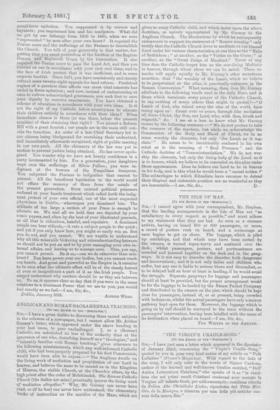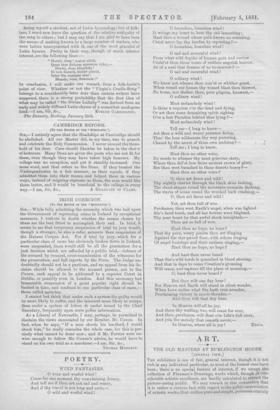"THE VIRGIN'S CRADLE-SONG."
[TO THE EDITOR OF THE "SPECTATOR:]
SIE,—I have just seen a letter which appeared in the Spectator of January 22nd, concerning the " Virgin's Cradle - Song," quoted by you in your very kind notice of my article on " Polk Lullabies" (Fraser's Magazine). With regard to the date of the song, 1 will only refer to the words of Signor Cardona, author of the learned and well-known treatise entitled, " Dell' Antica Lotteratura Catalans," who speaks of it as "la canti- lena the not primi secoli Cristiani credevasi aver mutate In Vorgine all' infante Gosh, per addormentarlo ; cantilena riferita da Follen Alto Chriatliche Licder, riprodotta dal Pais Hist. Gin. do /a Musique, a ritenuta per una delle pih antiehe can- zoni della nouva Era."
Being myself a student, not of Latin hymnology, but of folk- lore, I must now leave the question of the relative antiquity of the song to others ; but I may say, that I am glad to have been the means of making known to a large number of readers, who were before unacquainted with it, ono of the most graceful of Latin hymns. Pretty in their way, though of much inferior interest, are the following lines ;-
" normi, jesu! mater ridet,
Quae tam dulcem &annum vidot,— Dormi, Jose laIrindule I Si non dormis, mater plorat, Inter file cantinas orat Bland°, veni, Sommilo!"
In conclusion, I will make one remark, from a folk-lorist's point of view. Whether or not the "Virgin's Cradle-Song" belongs to a considerably later date than certain writers have supposed, there is a strong probability that the first idea of what may be called " the Divine Lullaby" was derived from an .early and widely diffused Latin rhyme of a somewhat analogous



































 Previous page
Previous page